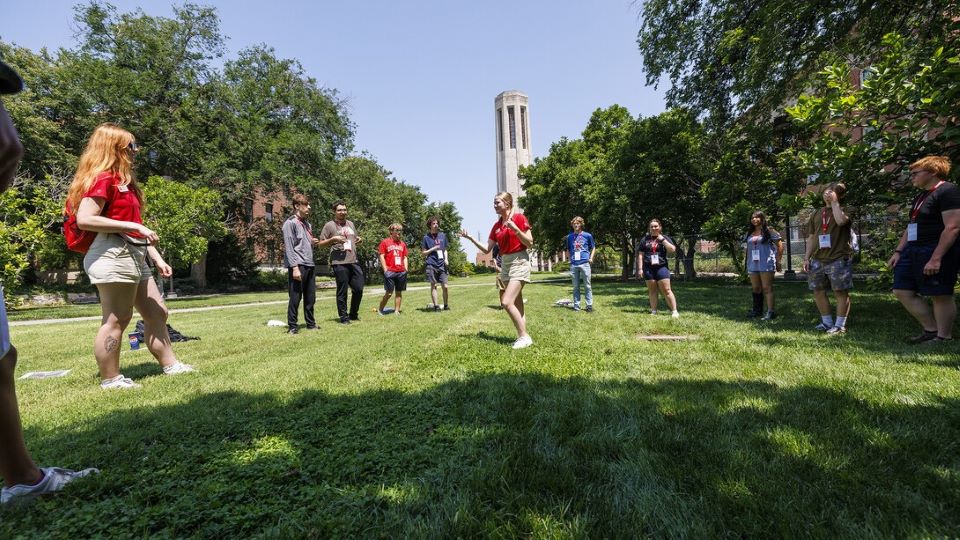
Scott Gardner, professor of biological sciences and curator of the Manter Laboratory of Parasitology at Nebraska, was interviewed for a pair of May 8 New York Times articles (1, 2) on presidential candidate Robert F. Kennedy Jr. suffering cognitive issues more than a decade ago, possibly from a parasite in his brain. Gardner said that once a worm is in the brain, cells calcify around it. “And you’re going to have basically almost like a tumor that’s there forever,” he said. “It’s not going to go anywhere.” Gardner said it is possible a worm could cause memory loss. He was also interviewed on the topic for CNN’s “OutFront” with Erin Burnett and Time magazine.
A novel study from the Center for Brain, Biology and Behavior at Nebraska and the University of Illinois at Urbana-Champaign has identified a specific nutrient profile in study participants who performed better cognitively. The profile is correlated with nutrients found in the Mediterranean diet, which research has previously associated with healthy brain aging. Stories on the study appeared in BBC Science Focus, the Independent, Inverse, New Atlas, NBC’s “Today” and 150-plus other media outlets.
William G. Thomas III, history, Angle Chair in the Humanities and associate dean for research and graduate education in the College of Arts and Sciences, was cited in a May 7 Baltimore Sun article on some people calling for the Francis Scott Key Bridge to be renamed. Key represented enslaved families in some freedom suits, but later made public comments that disparaged Black freedom and suggested he regretted his role in those lawsuits, Thomas said. Yahoo! News picked up the article.
Dawn O. Braithwaite, Willa Cather Professor of Communications Studies Emerita, was interviewed for a May 8 New York Times article on “kinkeeping,” or the work of keeping a family connected. She said that kinkeepers often find themselves “stuck in the middle” of complicated family dynamics or playing the role of gatekeepers of important family information — which can come with power, but also stress. (This article requires a subscription.)
Chigozie Obioma, English, wrote a May 9 guest column for The Economist titled “Chigozie Obioma laments the West’s growing ideological tribalism.” (This article requires a subscription.)
Obioma was featured in a May 27 New York Times article. He discussed his childhood dream of being a pro soccer player, his path to becoming a writer and his new novel, “The Road to the Country.” Reviews of the book, to be released June 4, have appeared in Financial Times, The Guardian, Publishers Weekly and The Wall Street Journal. Obioma’s two previous novels, “The Fisherman” and “An Orchestra of Minorities,” were finalists for the prestigious Booker Prize.
Obioma also wrote a May 30 piece for Esquire on his writing influences.
John Hibbing, professor emeritus of political science, was interviewed for a May 13 Associated Press article on the Nebraska Republican Party refusing to endorse any of the Republican incumbents who hold all five of the state’s congressional seats. The situation reflects the bitter divide between Donald Trump loyalists who control the Nebraska GOP, as well as several county Republican parties, and the more establishment-type Republicans previously at the helm, Hibbing said.
Kevin Smith, political science, was a featured guest on the May 15 episode of the American Psychological Association’s “Speaking of Psychology” podcast. The topic was how to cope with political stress this election season.
Smith was also interviewed for a May 20 USA Today article on Nebraska’s primary election results. He said the Nebraska Republican Party’s decision not to endorse any of the state’s congressional incumbents reflects the split in the political party nationwide.
Elizabeth Theiss-Morse, political science, co-wrote a May 21 op-ed for Inside Higher Ed with the University of North Carolina at Chapel Hill’s Jeff Spinner-Halev calling for the revival of civic respect on college campuses. They wrote that civic respect means listening in both interpersonal and impersonal ways to those with different views; avoiding political stereotyping; and not assuming that citizens who vote differently do so because they are poorly informed, ignorant or misled. Theiss-Morse and Spinner-Halev are co-authors of the new book “Respect and Loathing in American Democracy: Polarization, Moralization and the Undermining of Equailty.”
Patrice McMahon, political science, director of the University Honors Program, wrote a May 24 piece for The Conversation titled “Why Poland’s new government is challenged by abortion.” Poland’s three main coalition partners — the Civic Coalition, the Third Way and The Left — all want to soften the country’s near-total abortion ban but disagree on how this should happen and how far the changes should go, she wrote. The article was picked up by U.S. News and World Report, Yahoo! News and several other media outlets.


